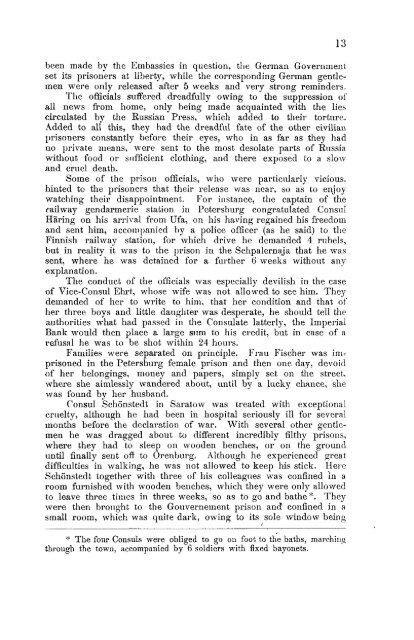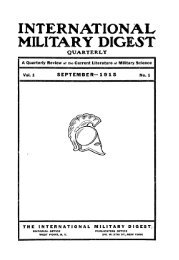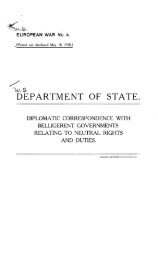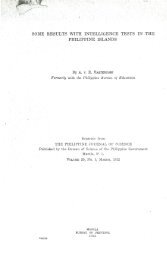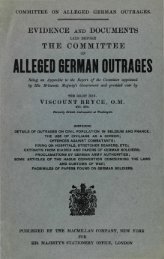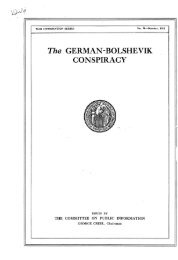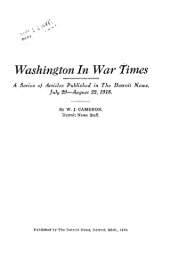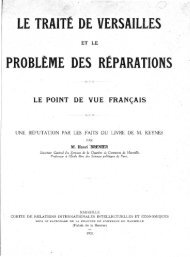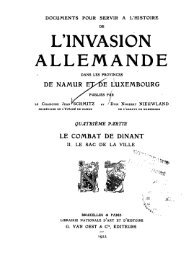- Page 1 and 2:
WAR- CHRONICLE WAR JOURNAL SOLDIERS
- Page 3 and 4:
Origin of the War. The name by whic
- Page 5 and 6:
that it was perpetrated at the inst
- Page 7 and 8:
announcement was immediately follow
- Page 9 and 10:
to consider the "noli me tangere" o
- Page 11 and 12:
is strictly prohibited by the ackno
- Page 13 and 14:
news service in the whole world she
- Page 15 and 16:
ditionary army of 100,000 men with
- Page 17 and 18:
military actions, and confirm the i
- Page 19 and 20:
I can testify to the following: Aft
- Page 21 and 22:
was blue in 'the face as a result o
- Page 23 and 24:
23 At the station I met about 300 p
- Page 25 and 26:
Pictures of the War
- Page 27 and 28:
ïrf H^r lilartrattâ, hftA Àj^fli
- Page 29 and 30:
The abominable bullets, rough piece
- Page 31 and 32:
Dum-Dum cartridges with the stamp o
- Page 33 and 34:
The British armoured cruiser " Cres
- Page 35 and 36:
•: : •• | n • § ft ^ I *
- Page 37 and 38:
BELGIUM 1-100,000 BELGIUM, T0WXAÏ
- Page 39 and 40:
The Truth about Louvain. Explanatio
- Page 41 and 42:
Camp of marines in the market place
- Page 43 and 44:
• * < • : . • • • • •
- Page 45 and 46:
Scene in Antwerp after the Siege. G
- Page 47 and 48:
25 Report of Count Reichenbach to t
- Page 49 and 50:
August 5. Inauguration of the Iron
- Page 51 and 52:
August 15. The Landsturin is called
- Page 53 and 54:
August 24. The victorious German Cr
- Page 55 and 56:
The Queen of Belgium and her childr
- Page 57 and 58:
September 11. The 22 nd Russian Arm
- Page 59 and 60:
37 September 21. Arnry Headquarters
- Page 61 and 62:
The German cruiser "Karlsruhe" sink
- Page 63 and 64:
41 October 13. The Kussian armoured
- Page 65 and 66:
43 Chief of General Staff v. Moltke
- Page 67 and 68:
German Soldiers' Letters Published
- Page 69 and 70:
47 How Officers and Soldiers live t
- Page 71 and 72:
WAR- CHRONICLE SOLDIERS' LETTERS *
- Page 73 and 74:
The Violation of Belgian Neutrality
- Page 75 and 76:
During the course of a later conver
- Page 77 and 78:
However, I took care not to admit t
- Page 79 and 80:
E Cover.
- Page 81 and 82:
»*. *i~*J *£-^ J £** i» Hi tit
- Page 83 and 84:
+7* s** éZZyfi. **ÏL*^y / *+*- tU
- Page 85 and 86:
Baron Greindl, who for several year
- Page 87 and 88:
. Amtsgericht Prum, 6 th November :
- Page 89 and 90:
II. Violation of International Law
- Page 91 and 92:
distance of the German mines from t
- Page 93 and 94:
War Journal 1 st November. The Turk
- Page 95 and 96:
The Russians beaten at Lake Wysztyt
- Page 97 and 98:
— - IN THE BELFRY OF ANTWERP CATH
- Page 99 and 100:
Old Patrician houses in Gent, which
- Page 101 and 102:
-^W^^Uuf 1 ^lijJAtnA-*' -tCuit» ^
- Page 103 and 104:
German medical corps soldiers taken
- Page 105 and 106:
Exploding 42-cm shell at the bombar
- Page 107 and 108:
German troops distributing food to
- Page 109 and 110:
The Cruiser "Emden" sinks an Englis
- Page 111 and 112:
^*^^^^tf^____ 1 » ; — fltttfa ^/
- Page 113 and 114:
27 The harbour of Libau blocked by
- Page 115 and 116:
30 th November. General vou Mackens
- Page 117 and 118:
cruel war lias also caused a very p
- Page 119 and 120:
33 tale to tell, they had all come
- Page 121 and 122:
35 first with the flag, I followed
- Page 123 and 124:
3 hours, my men being changed every
- Page 125 and 126:
39 is dyed red with their blood. Ou
- Page 127 and 128:
government architect, writes from t
- Page 129 and 130:
43 entrenchments. Now we are in the
- Page 131 and 132:
45 Luckily for him, the safe only c
- Page 133 and 134:
e forgotten. A captain in the Prinz
- Page 135 and 136:
49 it is weakened, her power will f
- Page 137 and 138:
we have a splendid view. The day be
- Page 139 and 140:
to 291910 ' WAR- CHRONICLE WAR JOUR
- Page 141 and 142:
Speech made by Herrn von Bethmann H
- Page 143 and 144:
us, for our own existence, to march
- Page 145 and 146:
A new impediment arose on account o
- Page 147 and 148:
through the veins of numberless and
- Page 149 and 150:
The fact that these documents were
- Page 151 and 152:
13 military authorities such a work
- Page 153 and 154:
of the order of "Pallotins" in Dual
- Page 155 and 156:
17 to the testimony of reliable wit
- Page 157 and 158:
4. The report of the French Chargé
- Page 159 and 160:
several very important documents, w
- Page 161 and 162:
23 the Blue Book not only Friday, b
- Page 163 and 164:
see clearly from the German White B
- Page 165:
27 clearly to the Minister that in
- Page 168 and 169:
30 5 th December. Fiirst Bfilow app
- Page 170 and 171:
! ' - p k^JK ' Pa ! 1 11"' ~i/^ •
- Page 172 and 173:
German soldiers celebrating Christm
- Page 174 and 175:
A Dutch-German frontier post in Bel
- Page 176 and 177:
Airmen with bombs, about to drop th
- Page 178 and 179:
The English cruiser "Hermes 1 " whi
- Page 180 and 181:
Interior of a Church in Neidenburg,
- Page 182 and 183:
Interior of the principal Church of
- Page 184 and 185:
• , ^E^ff"*& Hf®Bfef-" - * •
- Page 186 and 187:
feto^wj ' •B^t^-lk HHA •I*'* 1
- Page 188 and 189:
1 t 1 i JÊÊÉ - • : / L 1 //; i
- Page 190 and 191:
French prisoners receiving their mi
- Page 192 and 193:
M'ench prisoners ;it drill.
- Page 194 and 195:
32 German successes at Lowicz in No
- Page 196 and 197:
34 An "army order" of General Joffr
- Page 198 and 199:
36 30 th December. The German Gover
- Page 200 and 201:
38 from 5 fll till 9 th September t
- Page 202 and 203:
40 wehrmen were among the number. P
- Page 204 and 205:
42 A Young Artist's Field Letter. T
- Page 206 and 207:
44 Curious ! It was only when the f
- Page 208 and 209:
46 It was time for us to be relieve
- Page 210 and 211:
48 had air and space. My comrade ga
- Page 212 and 213:
50 A French Priest's Sermon. (From
- Page 214 and 215:
52 presented by my dear comrades. T
- Page 216 and 217:
54 But none of us were quite confid
- Page 218 and 219:
56 orders. In cold small rooms we w
- Page 220 and 221:
58 To-day we arrived at Valparaiso.
- Page 223 and 224:
m-m s~—-J WAR- CHRONICLE WAR JOUR
- Page 225 and 226:
Exchange of Telegrams between the K
- Page 227 and 228:
The French Attack. To the East of t
- Page 229 and 230:
war booty was considerable: 18 heav
- Page 231 and 232:
18, 34, 49; 143, -218, and 249 have
- Page 233 and 234:
offered by the Russian troops at Pr
- Page 235 and 236:
forces, consisting of the IL, IV.,
- Page 237 and 238:
The Renewed German Attack. At the b
- Page 239 and 240:
tified places is forbidden or not,
- Page 241 and 242:
The English inflict corporal Punish
- Page 243 and 244:
21 war in all the theatres of the w
- Page 245 and 246:
War Journal. isi January. The Kaise
- Page 247 and 248:
25 ll!l! January. A third attempt o
- Page 249 and 250:
*. "JE ^4 •• :*Wfe* \9J • -\|
- Page 251 and 252:
Life and traffic before the town-ha
- Page 253 and 254:
^^fW^^^^B 7'W «C ^ i 1 §•• Hf
- Page 255 and 256: Types of English torpedo destroyers
- Page 257 and 258: The Fiji-Islanders helping the Engl
- Page 259 and 260: Picture of a prisoner from Senegal,
- Page 261 and 262: ^tjKS&m'' ,'- ' % • sdtejl- ....
- Page 263 and 264: Austrian mines exploding at Przemys
- Page 265 and 266: Russian prisoners in the camp at Zo
- Page 267 and 268: i|p pfe** S. I aa .«»_^i ' * * "
- Page 269 and 270: 202 January. Success reported from
- Page 271: 29 Our Allies report new successes
- Page 274 and 275: 32 their dug-outs, into which they
- Page 276 and 277: 34 may have appeared to the wise me
- Page 278 and 279: 36 it has been raining. The mud is
- Page 280 and 281: 38 warriors. For many,—for most o
- Page 282 and 283: 40 as I could myself. I then went t
- Page 284 and 285: 42 English ships was burning, and a
- Page 286 and 287: 44 had never occurred to them that
- Page 288 and 289: 46 travels have taken me through Po
- Page 290 and 291: 4S that if the Allies ever reach th
- Page 292 and 293: 50 Every fourth German soldier in t
- Page 295 and 296: -v, JUL - WAR- CHRONICLE WAR JOURNA
- Page 297 and 298: The Imperial Chancellor's Official
- Page 299 and 300: years (Stormy applause) and with wh
- Page 301 and 302: news, the terror of the censorship
- Page 303 and 304: Government did not agree to the fir
- Page 305: suited and threatened by drunken of
- Page 309 and 310: to fetch his wife so that she could
- Page 311 and 312: mained unanswered. On 1st September
- Page 313 and 314: police and was not interfered with
- Page 315 and 316: Kitchener's Calumnies. The "Norddeu
- Page 317 and 318: 23 fight followed, but after 5 minu
- Page 319 and 320: 25 and Uzsok Passes did not succeed
- Page 321 and 322: 27 and severely threatened by the G
- Page 324 and 325: 30 just as the warm spring sun grad
- Page 326: 32 uate the entire line from the Du
- Page 329 and 330: IV. The Battle of Gorlice-Tarnow. O
- Page 331 and 332: W glfl Ar^ (5 * -ï^BB ® wy> •'!
- Page 333 and 334: The Russian atrocities in Memel: Fa
- Page 335 and 336: Home for German soldiers' children
- Page 337 and 338: Collection of "Gulaschkanonen" in t
- Page 339 and 340: w m ,»*- ••x ».*•'._ r| Wfc
- Page 341 and 342: © • sflr " JIB * mm ^•^••V
- Page 343 and 344: Our positions with entrenchments at
- Page 345 and 346: Burial of an English prisoner. The
- Page 347 and 348: Thus the task of maintaining the Sa
- Page 349 and 350: no discussion:' Our lists of casual
- Page 351 and 352: 41 double that distance, so that th
- Page 353 and 354: 43 On the Canal, between Steenstraa
- Page 355 and 356: (Translation.) 45 X. Army, 33rd Cor
- Page 357 and 358:
War Journal. May 1. The enemy defea
- Page 359 and 360:
May 6. 49 Further success reported
- Page 361 and 362:
Russian VIII. Army situated between
- Page 363 and 364:
Russian forces losing 2 cannons. Ne
- Page 365 and 366:
55 at the Loretto height and on the
- Page 367 and 368:
May 28. The Imperial Chancellor in
- Page 369 and 370:
German Soldiers' Letters published
- Page 371 and 372:
But when the command came to advanc
- Page 373 and 374:
Russians were put to flight on the
- Page 375 and 376:
65 were thrown up beside a large ha
- Page 377 and 378:
such an extent that it sank within
- Page 379 and 380:
69 ribbon on a white ground and has
- Page 381:
71 in his death struggle on the way
- Page 384 and 385:
Printed and published by M. Berg.
- Page 386 and 387:
4 sacred freedom of the Seas. The G
- Page 388 and 389:
6 but also by the explicit stipulat
- Page 390 and 391:
8 this year advised the British mer
- Page 392 and 393:
10 These are not new circumstances.
- Page 394 and 395:
12 offices of the United States in
- Page 396 and 397:
14 were employed between 13th—20t
- Page 398 and 399:
16 III. The Fall of Przemysl. Berli
- Page 400 and 401:
18 necting works were taken by assa
- Page 402 and 403:
20 Kaiser, took the entire enemy po
- Page 404 and 405:
22 the morning Rzesna'fell, which w
- Page 406 and 407:
24 One of the best examples of how
- Page 408 and 409:
26 points at which they were to pre
- Page 410 and 411:
28 blocked by several engines that
- Page 412 and 413:
F M "• 1Y v jÈUr ^^. mh r^vË fl
- Page 414 and 415:
„ ••>'".*>' . éoi^ >v.w Germ
- Page 416 and 417:
jf^^J B 'J^n L WÊÈ JSB *^?S5HB "
- Page 418 and 419:
The German Armies' supplies at Prze
- Page 420 and 421:
Prisoners taken at Przemysl before
- Page 422 and 423:
"'JM _' IK ' «=BB fTiiiii'tfi : iT
- Page 424 and 425:
"i — • * j - V if/ UP 41 , f. f
- Page 426 and 427:
•mHHHHHRURHmmRMN German soldiers
- Page 428 and 429:
30 TV. Results. Axial kilometers co
- Page 430 and 431:
32 4. At present we have cheap vege
- Page 432 and 433:
34 •oft", then at once a couple o
- Page 434 and 435:
36 At the present there are about 4
- Page 436 and 437:
38 see all for myself, and on Monda
- Page 438 and 439:
War Journal June 1. French attacks
- Page 440 and 441:
42 June 10. Enemy advances at the L
- Page 442 and 443:
44 June 20. Enemy positions west of
- Page 444 and 445:
46 An extensive attack carried out
- Page 446 and 447:
48 behaviour. I and 9 others of the
- Page 448 and 449:
50 and then the Bavarians were mast
- Page 450 and 451:
52 of sleep. Everybody wants to be
- Page 452:
54 meters from the coast. When we w


